SONG Sopheak
Senior Research Fellow
Dr Song Sopheak is the Deputy Executive Director in charge of research at CDRI. Prior to this current position, he had been with CDRI’s Centre for Educational Research and Innovation since 2016, first as the research fellow and then the director between 2020 and 2022. His international experience in research career includes fellowships at the Global Career Design Center of Hiroshima University, Japan; at the Centre for the Study of Higher Education, University of Melbourne, Australia; and at the Swiss Federal Institute for Vocational Education and Training, Switzerland. At CDRI, he has led several research projects on post-secondary education and training in Cambodia with focus on STEM education, workforce development, employer engagement, and technology integration in education. Dr Song Sopheak holds a PhD in Educational Science and Humanities from Hiroshima University, Japan.
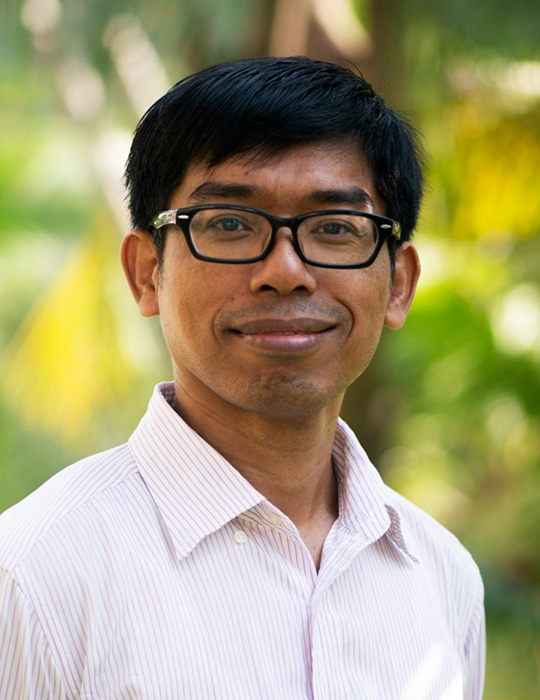
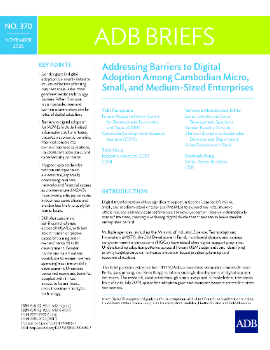
Gender gaps in digital adoption are mainly linked to structural factors affecting business scale rather than gender-specific technology barriers. When firm size is comparable, men and women owners show similar rates of digital adoption.Barriers to digital adoption for MSMEs include limited information, skill shortages, uncertain economic benefits,...

This policy brief presents key findings from the technical report "Learning to Improve Book Resource Operational Systems (LIBROS) in Cambodia". The study examined the perceived impacts, development, and implementing factors of the Track and Trace (TnT) system, a digital intervention implemented by the Ministry of Education, Youth, and Sport (MoEYS)...

During the First PAGE National Steering Committee in Cambodia, PAGE also presented a summary brief outlining five priorities that serves as a roadmap for policymakers and stakeholders to identify the obstacles and opportunities for fostering a green economic transition in Cambodia: Unlocking private and public finance More evidence on different...

Children in low-and middle-income countries often struggle to master foundational academic skills, such as reading, despite years of schooling. Quality learning materials are essential to addressing this issue. In this Learning to Improve Books Resource Operational Systems (LIBROS) study, we explore ways to enhance the primary-level book supply cha...
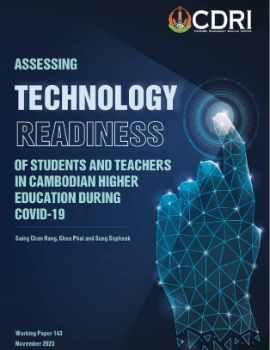
This study examines the technology readiness of students and teachers in Cambodian higher education institutions (HEIs) during the COVID-19 pandemic, which forced a rapid shift to online learning. Using survey data from 370 teachers and 1,338 students across 22 HEIs, the study applies the Technology Readiness Index (TRI 2.0) to assess readiness lev...
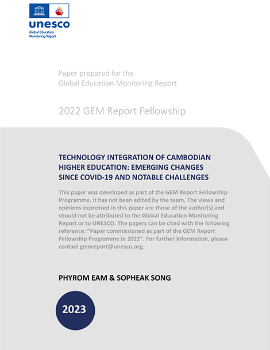
The second decade of the 21st century marks the time the Royal Government of Cambodia (RGC) officially directs the nation’s public sector, economy, and society to accelerate technology adoption and digital transformation. This present study aims to observe developments of such direction in Cambodian higher education (HE) sub-sector before and in re...
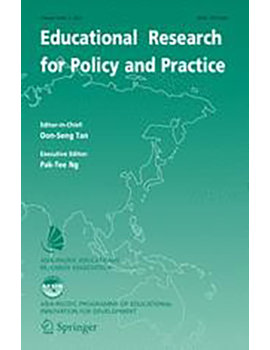
This study aims to investigate the characteristics of students who switch versus those who do not switch when they transition from upper secondary to higher education. The data from 1338 students randomly selected from 21 HEIs in Cambodia in 2020 found that upper secondary school students are more likely than not to switch academic majors when they...
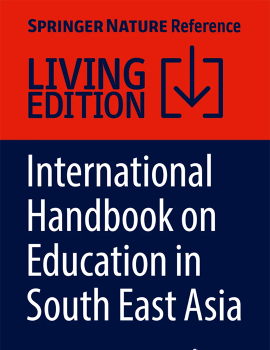
The Royal Government of Cambodia acknowledges the vital role of technical and vocational education and training (TVET) in developing a high-quality workforce to better respond to labor market demand and contribute to the national development agenda. In the past decade, with support from and collaboration with development partners, the Government ha...
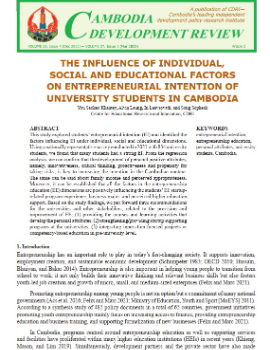
This study explored students’ entrepreneurial intention (EI) and identified the factors influencing EI under individual, social and educational dimensions. Using a nationally representative survey conducted in 2021 with 834 university students, we found that many students had a strong EI. From the regression analysis, we can confirm that the develo...
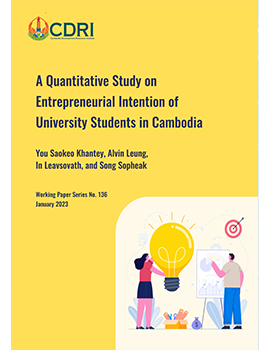
This study explores the entrepreneurial intentions of Cambodian university students and the factors influencing their aspirations to pursue entrepreneurial careers. Drawing on survey data from 834 students across 19 higher education institutions, the research examines students’ career planning, business engagement, and exposure to entrepreneurship...
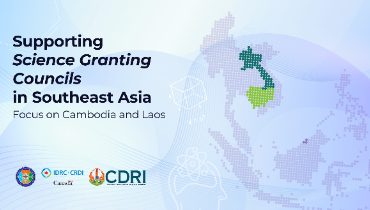
National science granting councils play a pivotal role in driving innovation and societal progress, particularly in developing countries. Their close ties to policymakers and beneficiaries, along with their profound understanding of national research environments and interests, position them uniquely and strategically to navigate the evolving com...
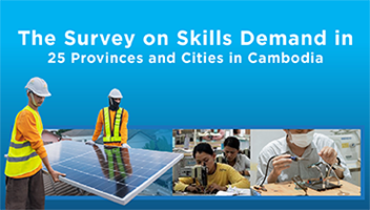
This nationwide survey, conducted by the Cambodia Development Resource Institute (CDRI) in partnership with the Ministry of Labour and Vocational Training (MLVT), assesses current and emerging skills demand across provinces and municipalities in Cambodia. The study supports the recalibration of the TVET 1.5M Programme by identifying priority sk...

Educational technology (EdTech) is a broad term encompassing tools and resources used in various aspects of education. Its global rise, particularly in developing countries, offers potential solutions to educational challenges. However, while EdTech promises tailored solutions, policymakers need a deeper understanding of its effective and sustainab...

CDRI has been conducting the Moving out of Poverty (MOP) survey since 1996/1997 in 3 village household samples and this sample have been extended 11 villages across 7 provinces by 2020. CDRI surveys the same 1000 households every three years to track the poverty dynamics across the five main regions of Cambodia. This rare longitudinal dataset i...

Micro, small, and medium-sized enterprises (MSMEs) often face challenges in utilizing digital technologies despite the vital roles of these technologies in business development. In particular, female-led MSMEs are less likely to use digital technologies. Previous studies have identified several barriers to digital technology adoption such as poor i...

The Cambodia STI roadmap aims to have 50% of university graduates majoring in STEM subjects, with 40% of those graduates being women, by 2030. Despite the government's efforts to promote STEM education and careers, the number of students majoring in STEM, particularly female students, remains very low compared to other countries in the region. Stud...

The innovation and entrepreneurial activities have multiplied recently, with many new companies emerging in various industries. However, start-ups face many challenges, such as access to talent, idea, markets, and funding. Creating new idea or launching business is essential to have partners that can stimulate their thoughts and elevate both ca...

The ASEAN Committee on Science, Technology and Innovation (COSTI) works to leverage Science & Technology to address common problems faced in the ASEAN region and to raise the level of scientific and technological advancement in ASEAN Member States (AMS). The work of the Committee is guided by the ASEAN Plan of Action on Science, Technology & Innova...
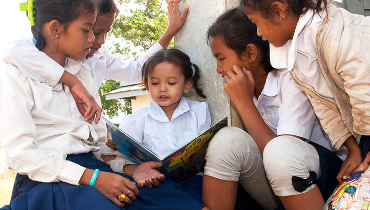
This is a part of the Supporting Holistic and Actionable Research in Education (SHARE), a five-year cooperative agreement with the University of Notre Dame (UND) supported by the USAID’s new Bureau for Development, Democracy, and Innovation/Center for Education (DDI/EDU), to advance global education learning priorities to improve learning outcomes....
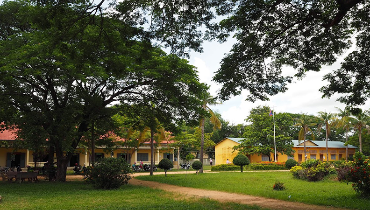
The Covid-19 pandemic has brought about educational disruptions from pre-school to higher education in Cambodia and around the world. Although the impact of the pandemic in Cambodia was relatively low in comparison to other countries in the region and the world in 2020, and schools were able to reopen its door again in early 2021, the February 20,...
